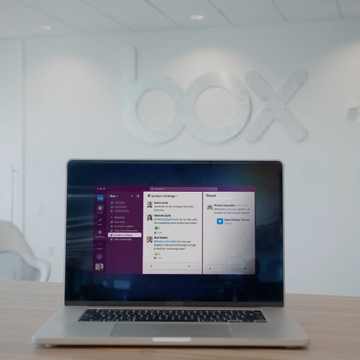The rate of change is happening faster than ever in the technology world, and many companies are struggling to keep up. Luckily, Versent, a company founded and based in Australia, has stepped in as a leading Amazon Web Services (AWS) partner, helping companies of all sizes embed solutions like automation and cloud services.
Since it was founded in 2015, Versent has earned numerous awards and ranked strongly in the AFR Fast 100, cementing its position as one of Australia’s fastest-growing IT companies. To support this rapid growth, Versent was an early adopter of Slack, the channel-based messaging platform.
Versent’s three founders initially tried email, but it quickly became overwhelming. “We’d get over a thousand emails a day, which made it really hard to sort the noise from the work,” says Versent’s general manager, Dean Robinson. “Our founders saw Slack as a differentiator in how we both operated and communicated.”
Expanding from three to 400 employees in five years, Versent continues to foster its culture, perfect workflows and find innovative solutions in Slack.
“We use Slack for everything. If it’s not in Slack, it doesn’t happen at Versent,” Robinson says.

“Our founders chose Slack because they wanted to act and behave like a startup, but work with enterprises and provide quality outcomes for customers.”
Using Slack channels to solve issues and complete projects faster
To empower its 400 employees in Sydney, Melbourne, Perth, Brisbane, Singapore and Denver to share and leverage knowledge, Versent relies on Slack channels, digital spaces to exchange messages, tools and files.
Channel guidelines help maintain efficiency. “If someone creates a Slack channel that’s out of pattern, it very quickly gets updated so it’s easier to find what you’re looking for,” Robinson says.
Everyone from the managed services division works together in the #versent-managed-services channel, where they connect on current events and swarm tech issues.
“Instead of staring at an issue by yourself, you’ve instantly got 50 to 60 engineers looking at it with you in the Slack channel,” Robinson says. “That translates into really quality customer outcomes because you’re leveraging the whole team’s knowledge.”
Each customer has a dedicated Slack channel as well. “Since it’s a continued log, those Slack channels are a great way to keep things organised and contained,” Robinson says. “With the pandemic, Slack is especially crucial for staff and customer engagement because we’re not able to meet face-to-face anymore.”
To stay on top of activities at customer sites, Versent has leaned into Slack apps, allowing employees to connect the tools they already use with Slack.
“There’s a key productivity gain for us thanks to Slack integrations with PagerDuty, Jira, Pingdom, Zoom and ServiceNow,” Robinson says. “It’s a great way to make sure customers receive the response and service they’re paying for.”
Recently, all facets of the business came together in Slack Connect to work on a proposal for a large government entity. Over the course of Versent’s relationship with the customer, the team used the cross-functional channel to:
- Kick off the project and build the proposal with subject matter experts
- Build out and discuss the presentation with marketing, strategy and general managers
- Finalise finances and close out the partnership with company executives
“It really defines the heart and soul of Slack: It’s all about collaboration and having that ability to share documents, and code snippets and information in real time,” Robinson says.
Boosting morale and streamlining tasks with Slack automations
To make it easy to share news about a job well done, Versent built a “shout out” automation using Slack’s Workflow Builder. When someone wants to recognise a teammate and their work, this automation kicks off a simple workflow that they fill out right in Slack.
“It makes it easier for people to recognise each other with the Workflow Builder,” Robinson says. “They can just follow that process and get the message out to everyone without stressing that they’re sending a message to 400 people.”
Versent also leveraged Slack to simplify timesheets, an often cumbersome but necessary task. Before, payroll would have to track down employees who forgot to submit their timesheets, wasting time and resources.
Now, a custom Slack integration collects data from the timesheet program at a set time each month, and then funnels it back into a personalised Slack message for each employee. It then sends a reminder until it’s complete.
“The custom Slack integration has reduced the burden on our own team and the back office because they don’t have to chase us down,” Robinson says.

Building a family-style culture in Slack from the beginning
Slack is ingrained in Versent’s culture, with five years’ worth of custom emojis: Every employee has at least three or four of their own, says Robinson, with a grand total of 2,500. “Every time I see a new Slack emoji, it makes me laugh. Any and every possible emoji exists in Slack.”
There’s also a long list of social connection channels, including #dad-jokes, #rants (exclusively for ranting in ALL CAPS), #growing-vegetables, #pets,#diy-tips and more.
“There’s really a family-style culture at Versent,” Robinson says. “We look out for each other in Slack. It really drives strong engagement and ultimately better outcomes for our customers.”















